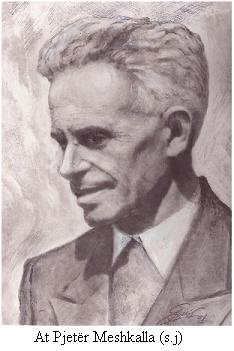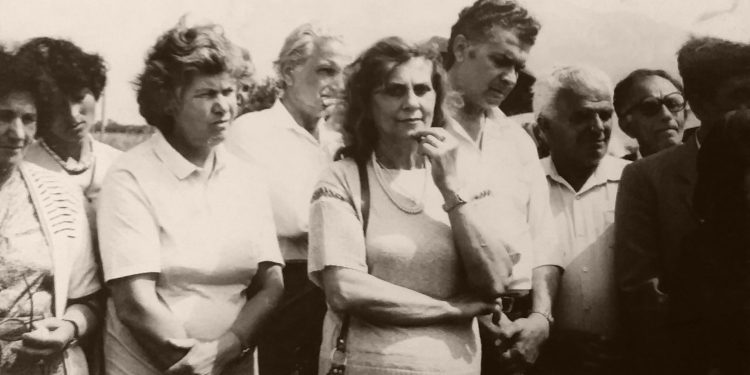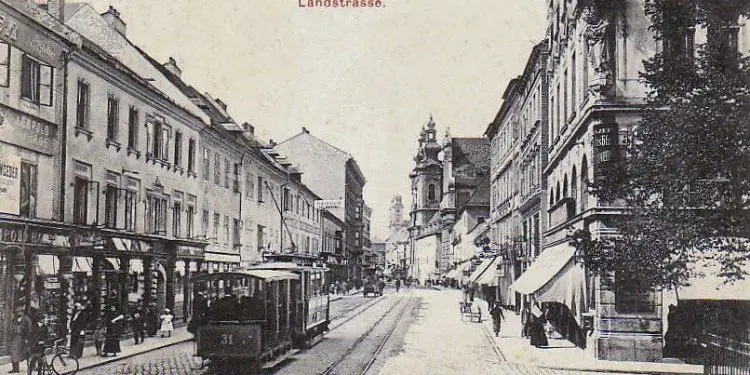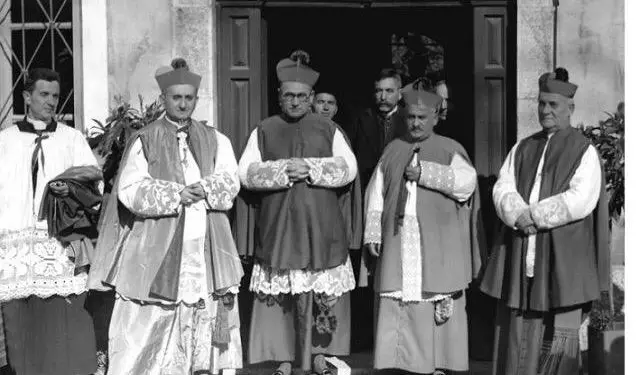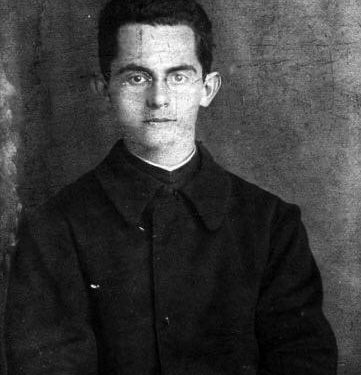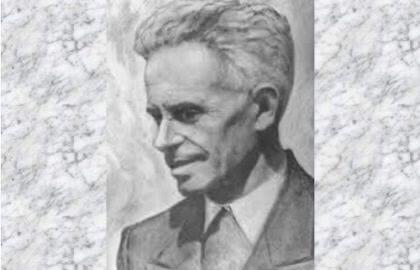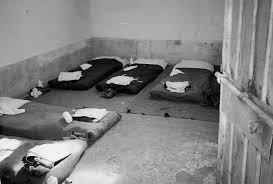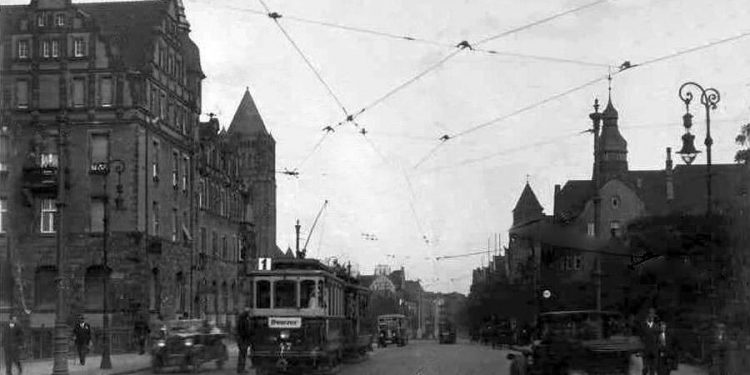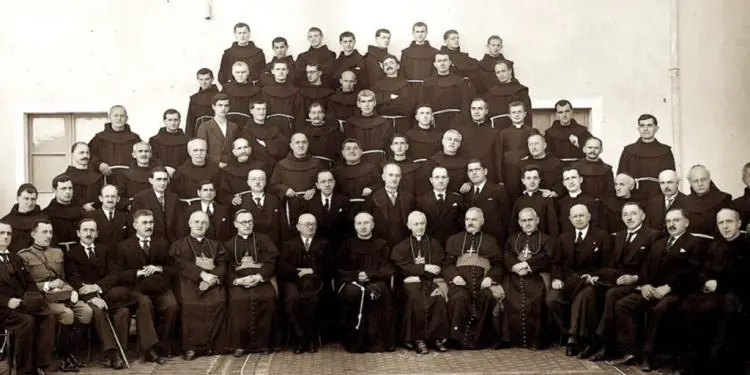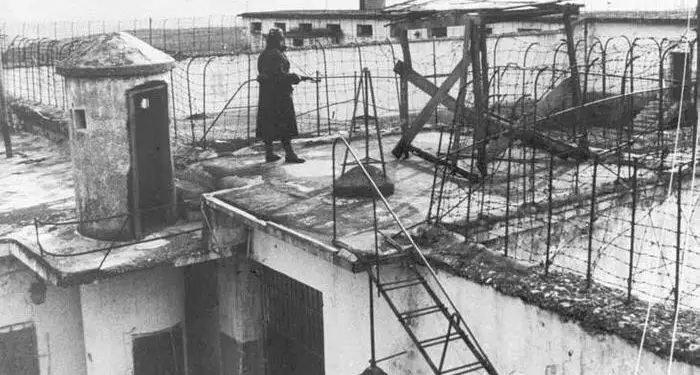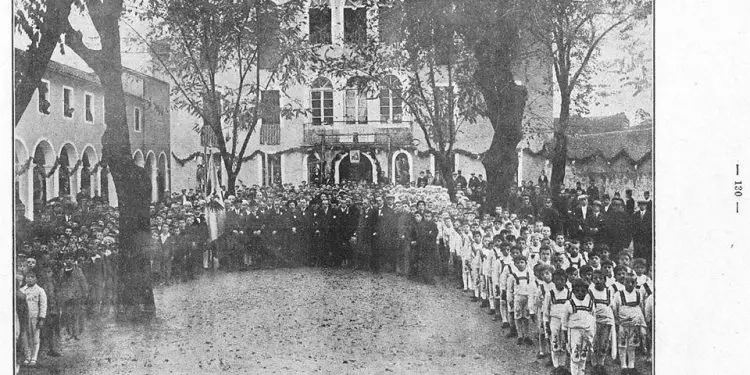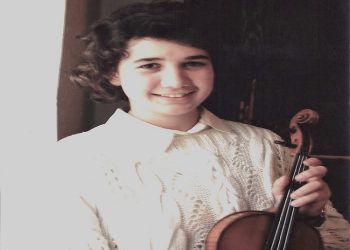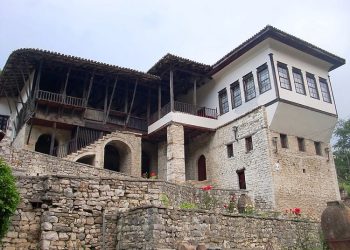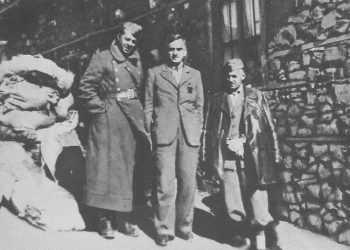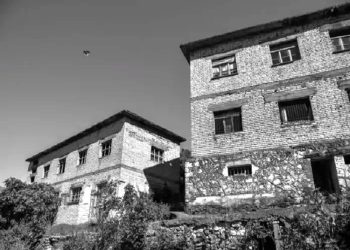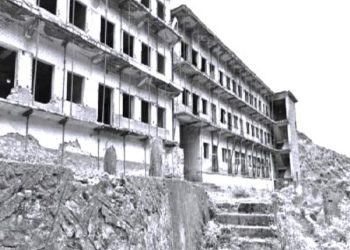Dashnor Kaloçi
Memorie.al publishes the unknown story of Padër Meshkallës, originally from the village from which they had inherited the surname and living in the street “Daulles” of the city of Shkodra where he was born in 1901, who after finishing the Seminary of Jesuits, was sent to further his studies in Austria, where he graduated from the Theological University of Linz, in Theology and Philosophy. Appointment of the Ladder to the Order of Jesus, serving as a priest for 12 years away from his family and homeland, as in Poland, Italy, etc., to return in 1931 to his hometown, where he was appointed as a professor of Theology and Philosophy at the Jesuit Seminary. Meshkala’s engagement in the periodical press of the period of the Zog Monarchy, where he published a series of articles in the newspapers “Lajmëtari i Zëmrës të Kristit” and “Leka”, where he condemned the Italian intentions and pro-fascist views that had begun to propagate a part of the Catholic Clergy at that time. . How could Meshkalla escape from the shooting by the Germans of about 200 inhabitants of Tirana in mid-November 1944 and his opposition to the communist regime since their coming to power, propagating anti-communist ideas to the school youth?! The persecution of Padër Meshkala by the communist regime of Enver Hoxha after the letter-tip he sent to the Prime Minister Mehmet Shehu in 1967, (where he reminded him of the promises made in 1946, that the communist government would not destroy churches and mosques), which led to him being sentenced to 15 years in political prison, which he served in Burrell Prison.
“The external obstruction of force majeure will have on me only the effect that stone or earth has, which impedes the flow of water. People know me and know well how I melted life for him. I say that with this war, against fees, we are being discredited in the eyes and face of the world, to which we have given solemn promises, for the freedoms and human rights in Albania. When in 1945, in Tirana, on March 8, I complained to you, Your Excellency, that we had heard from the communists, the words: “This Church, we will make cinema”. You replied, “This is hostile propaganda.” Indeed, not even the fiercest enemy, not even the most hostile propaganda in 22 years, could have been done to you. He did not push me to write with you, Excellency, neither hatred, nor ambition, nor interest, but only conscience, truth and goodness “. This was stated in other words in a memorandum letter, addressed to Prime Minister Mehmet Shehu in 1967, by Father Pjetër Meshkallës, one of the most famous Catholic clergy in the city of Shkodra. Regarding this and the whole story of his life, it is about this article that Memorie.al has prepared based on various evidences from the city of Shkodra.
Student of the Theological University in Linz
Pjetër Meshkalla, was born on September 25, 1901 in the city of Shkodra, in a poor family that at that time lived in the street of “Daulle. Peter’s father was originally from the village of Meshkale, not far from the city, and his mother, a noble woman, was from Shiroka. Peter, who stood out among his peers for his ingenuity, after completing his primary education, was sent to attend classes at the Jesuit Seminary in the city of Shkodra, which he completed in 1918. After graduating from that school, Peter, he was granted the right to pursue higher studies at the Theological-Philosophical University in Linz, Austria where he went in September 1918 and studied there for four years. During the years of the First World War, when Peter and his friend Kolec Prenushi were captured in Austria, they lost contact with their families in Shkodra, for almost a year. A military doctor, who at that time lived in Shkodra, near the Prenushi family, became a mediator and through the Austrian soldiers, was able to get in touch with the two students from Shkodra, sending them from time to time and food from their families… Since Peter’s family was poor and could not afford to help him, he had a lot of help from the family of his friend, Kolec Prenushi, and since then, Peter would remain a friend of the Prenush family… After graduating from the Theological University in Linz, where Meshkalla majored in Theology and Philosophy, he chose to study and work as a priest in the Jesuit Order for nearly 12 years, moving away from his homeland, Albania, serving in Poland (in the city of Potsdam) and in various provinces of Italy. During all this long stay that Meshkalla spent away from Albania, in the service of Jesus’ command, he attended various schools and courses, perfecting his knowledge and being formed with a wide theoretical baggage. Pjetër Meshkalla, returned from his studies abroad, in 1931 and was appointed lecturer at the Jesuit Seminary in Shkodra, in his hometown. In that school, where Pjetri taught Albanian language and philosophy, he taught until 1937. In the diploma he received at the University of Linz from Meshkalla, his characteristic was written: “Pjetër Meshkalla, a student with very high education in the field of Theology and Philosophy. It is very irritating and recommended not to be in the direction of the Clergy. “He is committed to educating the youth.” According to the characteristics that came from Austria and according to the tendencies of Meshkala, he was appointed in the city of Shkodra by his superiors, to open the districts “St. John Bosco”. Those out-of-school districts aimed at educating the youth with patriotic feelings and the development of many sports activities, in terms of physical fitness of young students. In addition to his great engagement in those districts, Padre Meshkalla, devoted a special time to journalistic writings in the periodical press of that time, where he engaged especially in “The Messenger of the Heart of Christ” and “Leka”. In many of those articles, Padër Meshkalla called for and preached the patriotism that should be embraced, especially by the school youth, and from time to time, came out openly against the pro-fascist views that had begun to propagate a part of the Clergy in Albania. Against those views, Meshkalla has often spoken in the inner circles of the clergy and in various meetings, openly attacking the Italian Jesuits and creating so deep contradictions that they forced him to leave Shkodra and break with the order. was located in Tirana.
Padër Meshkalla, saves 200 inhabitants of Tirana from being shot by the Germans!
After leaving Shkodra and coming to Tirana, Padër Meshkalla, was again engaged in the establishment of extracurricular circles “St. John Bosco”, where he gathered the youth of Tirana, regardless of religion and political beliefs. In Tirana, Meshkala, served near the Church of the Heart of Christ, on Kavaja Street, from 1937 to 1946. That period of time for Meshkala, would be and would be considered by him, as a period of high productivity, where he prepared many textbooks and various curricula, which were studied not only in religious schools, but also secular ones. He also continued to collaborate with the press of the time, where he managed to publish many different articles, expressing his anti-communist and anti-fascist feelings. In that period, Meshkalla, had consequences from the state authorities, especially after the occupation of Albania by fascist Italy, where he did not allow students in schools to greet and swear under the Italian flag. One of the most notable events of Meshkala, which he won the admiration and sympathy of many Tirana families, was that of November 1944, when the last column of Germans was leaving Tirana via Durrës and Kavaja streets. During the withdrawal of the Germans from the capital, they were occasionally hit with infrequent rifle shots. Following this, the German convoy stopped and several squads of soldiers with automatic weapons and incendiary weapons, started firing at those houses where they suspected the shooting was taking place, executing quite a few residents who had their houses on those two roads. Several German teams entered Kavaja Street near the Church, where Padre Meshkalla was serving, as many shots had been fired from there. At this time, about 200 residents of that street, fearing being shot, knocked on the doors of the Church and Meshkalla sheltered them all there. From the numerous movements and the noise created, the Germans understood them and made it to the church doors, preparing for reprisals and ready to shoot them. After they knocked on the door of the church with their guns, Padre Meshkalla came out in front of you and, in fluent German, addressed the Germans, telling them that the people he had there in the church were not terrorists and none of them had not shot. They were mere believers, who had come there to stay away from conflicts that might arise. After the words of Padre Meshkala, the Germans turned back, riding in their cars waiting glowing, to leave Tirana as soon as possible. After 1944, when the Albanian Communist Government became closely associated with the Yugoslavs, Padre Meshkalla did a great job propagating the patriotic, anti-Slavic spirit to the school youth and exposing the pro-Slavic communist line. Thus, Meshkalla preached to those young people who were infected by the communist ideal, saying: “Your communist principles are a utopia, you will not be able to realize those principles, but unfortunately, you are endangering the lives of national ideals, becoming blind soldiers of Stalin.
Mehmet Shehu asks for cooperation from Padër Meshkalla
After the end of the war, seeing the hard line being pursued by the communist leaders in charge of the country and the great atheist propaganda developed by them, Padre Meshkalla openly propagated the idea of supporting Albania to the Anglo-American allies. Seeing the great influence that Meshkalla enjoyed in the intellectual circles of Tirana, the Minister of Internal Affairs, Mehmet Shehu, asked him for a meeting, which took place in a house in New Tirana. From the beginning of the conversation, Mehmet Shehu asked for Meshkala’s cooperation, which was categorically rejected by him. “You are atheists and the path of cooperation between us is completely impossible, you will close churches and mosques and turn them into clubs and cinemas,” Meshkalla replied to Mehmet Shehu. Seeing that he could not benefit from that conversation, as he was leaving, Mehmet Shehu addressed Padër Meshkala, saying that: the work of closing churches and mosques and turning them into clubs and cinemas was nothing other than a reactionary slogan. After this event, sometime in 1946, Meshkalla made a retort with the newspaper “Bashkimi” demanding the rights and freedom of religion and directly attacking the Government for lack of democracy. What angered Meshkalla the most and forced him to reply to the newspaper was the great terror being exercised over the intellectuals who had graduated from schools in the West and the blows being dealt to the Catholic Clergy, especially in the Shkodra Region.
Meshkalla seeks the help of foreign diplomatic missions!
Seeing the great terror that the communist government of Tirana was exercising over the Catholic Clergy and other faiths, Padre Meshkalla, together with Monsignor Frano Gjini, (Vatican deputy delegate), Dom Shtjefën Kurti, (parish priest of Tirana), etc., drafted a letter and sent it to the foreign diplomatic missions, which were attached to Tirana and precisely to the American, English and French ones. In that letter they pointed out the harsh repression that the Communist Government inflicted on the Catholic Clergy and other religious faiths. At the same time, they sent a copy of that letter to the Albanian Prime Minister, Colonel-General, Enver Hoxha. This several-page letter was all compiled by Padër Meshkala and signed by other clerics. But that letter, became the reason for the arrest of all its signatories, who went to trial and received severe sentences. In that trial, Meshkalla was sentenced to 15 years in prison, and spent most of it in Burrell Prison.
Meshkalla 15 years in prison in Burrel
He served his sentence, which Meshkalla would spend most of his time in Burrell Prison, helping young people who wanted to learn foreign languages. In that prison, Meshkalla opened many language courses and explained to his accomplices the philosophy he had studied in Western schools. Meshkalla spoke and wrote in Italian, Greek, German, English, Polish, Serbo-Croatian, French, Spanish and Latin. He also had philosophical debates with some of his accomplices who were considered part of the intellectual elite who were then convicted in Burrel prison, such as: Suat Asllani, Zef Mala, Gjergj Kokoshi, Hafiz Ali Tari, Arshi Pipa, etc. In that prison where political and philosophical debates were raging for days by former prime ministers, ministers, deputies, ambassadors, writers, the military, etc., at the end of them, they closed with the usual expression. “This is se. Because Padër Meshkalla said so”. After every debate that lasted for days, at the end Padre Meshkalla was asked, who said: “Gentlemen, I think it could be so…”! Regarding this, Arshi Pipa, one of Meshkala’s accomplices in Burrel prison, wrote, among other things: “I met Father Meshkala, I met him in Burrel prison, where he was brought together with a group of prisoners from Shkodra prison, I do not remember exactly the years 1953-1954. He was then in his fifties, petite and petite in stature, with two eyes like cats. What shone in his eyes, his tongue flashed, even though his cry was pale and peaceful “Suaviter in modo, sed fortiter in re” (soft in means, strong in purpose). His words were simple and straightforward, as are commonly believed by people with strong convictions. He practiced his profession as a Soldier of Christ, in the service of the needy. At that time, the director of the prison was a hangman who liked to give speeches, in front of your prisoners, but he had some who did not shut their mouths, and among them, Father Meshkalla, was divided into a sign. He answered where he should, without bringing the cry. But his word also had authority over the director, who was a director, having studied, theology and philosophy. It was a way of sharpening the edge of the mind. “The balls from the laziness of imprisonment, Father Meshkalla, will remain in the annals of the salvaged Catholic Church, like the one who suffered, salvaged for a long time, without being trapped, until he had a soul.” Meshkalla was released from prison in 1960 and returned to the city of Shkodra, settling in his ground floor house, in the neighborhood “Ballabane”, where his elderly mother and an aunt’s daughter lived, who had taken care of of, throughout prison time. In that ground floor room, Meshkalla performed all the religious rites, as he was not given the right to perform them legally. One of the greatest losses that Meshkalla had suffered, as he told his relatives and friends, was not the prison of 15 years that he had spent, that even there in prison, there were people and they as slaves of God, wanted and religious services and someone had to do them, and that luck said Meshkalla, had met him. The biggest loss, Meshkalla considered the seizure of the rich library that he had with all the articles, studies and textbooks, which he had prepared for years. From the mid-sixties, when the communist regime was preparing for the final blow against the Clergy and the final closure of all religious institutions, in March 1967, the Catholic Clergy of Shkodra, gathered at the Assembly of “Arrës Madhe”. at last he heard the words of Padre Meshkala: “And no matter what happens, we must give our services to anyone who will need them.”
Meshkalla sends a memorandum to the Prime Minister, Mehmet Shehu
Seeing that the wave of repression exercised by the communist regime against the Clergy was growing every day, fully convinced of the consequences that awaited him, Padre Meshkalla decided to write a letter (memorandum type) to Prime Minister Mehmet Shehu, which he wrote on April 5, 1967, which stated:
Chairman of the Council of Ministers
Mehmet Shehu, in the Prime Minister
Excellency. The day before yesterday, on April 3, 1967, at 7 pm, most of the Catholic clergy, who are in Shkodra today, were summoned to the Red Candle Hall of the Executive Committee. We were told, among other things, that we would hand over everything we had, except the necessary personal clothing and sleeping clothes, while the others, all belonged to the people and the people had to return to them and that they would not exercise any religious service, nor privately. This has been decided by the people. I thought of addressing this letter to Your Excellency, in order to express my opinion, not differently, but as a human being. As for my books, ecclesiastical things, etc., let them come and get them when they want, it is not the first time that I go out on the highway. But I want to express some thoughts in general. The manuscripts are the inviolable and sacred property of the author, unless he submits them himself, let them not be against the State Security. As for other fortunes, neither the generosity and manliness of the people, nor the most basic natural law, accept that something that has been forgiven once to a certain person, be asked again by the giver, as his thing. Speculations and abuses are hit. And the truth is that the people have always accompanied their priest, with oil, as the representative of their religion. A black shadow fell on the people, when the churches were closed, the bell towers were knocked down and especially, you saw it, you made fun of it, the religious people, you insulted them, so deeply the feelings of faith, feelings so sacred. The same effect was achieved by the unbridled, discrediting anti-religious campaign, carried out by all means of propaganda. In response, the people have filled the churches until their last moments. What value, then, is the attitude of a minority, unconscious, or frightened, with all kinds of pressures? Especially the frightened part with threats, pressures, promises, and dismissals, suffers the most torture, because they are tied by a loaf of bread, forced to deny with their mouths, what they believe and so the campaign that is being carried out, aims to form a generation, without civil courage, without manhood, opportunist, servile, you ruin the character of the Albanian, to the detriment of the homeland. People are afraid to meet and greet on the street, with friends who are “touched”. And who knows, who they are! There is a lot of talk about the 500-year-old inquisition and not very objectively. What about this twentieth century? Come to me now. I our line of my life, I cannot change, but I will continue until we have breath. The external obstacle of force majeure, will have on me, only that effect, which made stone or earth, which impedes the flow of water. People know me and know well how I melted life for him. I say that with this war, against fees, we are being discredited in the eyes and face of the world, to which we have given solemn promises, for the freedoms and human rights in Albania. When in 1945, in Tirana, on March 8, I complained to you, Your Excellency, that we had heard from the communists, the words: “This Church, we will make cinema”. You replied, “This is hostile propaganda.” Indeed, not even the fiercest enemy, not even the most hostile propaganda in 22 years, could have been done to you. He did not push me to write with you, Excellency, neither hatred, nor ambition, nor interest, but only conscience, truth and goodness “.
Regards
Pjetër Meshkalla
Catholic Priest of the Society of Jesus.
Tirana, 5 April 1967
After receiving this letter from Mehmet Shehu, on April 29, by order of Tirana, the arrest of Meshkala was decided, but first it was ordered that he should be unmasked publicly, in front of the people of Shkodra.
Unmasking of the Ladder at the Pedagogical Institute and another 10 years in prison
According to the orders received from official Tirana, the bodies of the Internal Affairs Branch of Shkodra Region arrested Padër Meshkalla and initially they made his public unmasking (in one of the halls of the Pedagogical Institute of Shkodra), where the “intellectuals” of the city and in a presidium, where they had taken place to lead the unmasking meeting: Luigj Shala as chairman, Vat Deda, Arif Gashi, Palok Kraja, etc. Outside the Institute, autopolants were put up to listen to the people. Discussions against religion and God, started from Jup Kastrati, Angjelin Ulit, Sh. O., Ramiz Hafizit et al. Following this unmasking trial, the Shkodra Court sentenced Padër Meshkala to 10 years in prison and confiscation of property. In that trial, Meshkalla stated: “If people freely express their opinions, this power will not last long. We are below and you are above the earth, but we are stronger than you. Padër Meshkalla spent ten years in prison in forced labor camps and was released only in 1977, returning to the city of Shkodra, to his ground floor house. But he no longer found there his noble mother and cousin Gonxhen, who had followed him through prisons for 25 years. Left without any means of livelihood, he would be found near many families in Shkodra who helped him to live, and that lasted until July 28, 1988, when he passed away at the age of 87. At the end of July 1988, when in the city of Shkodra, in two – three main points near the center in Piazza where the obituary announcements were displayed, in some pieces of paper written by an untrained hand, it was announced: “Pjetër Meshkalla vdek has died”! ” This news spread with extraordinary speed to all the houses in Shkodra that July day amidst that scorching heat. The next day, when the death of Padër Meshkala was announced, many believers from Shkodra attended his funeral, going a few hours ahead to the cemetery, for fear of surveillance by “competent authorities”. In the escort of Meshkala to the last apartment, together with the former elderly clerics, his friends such as: Dom Ndoc Noja, Dom Luigj Kçira, Zef Buka, Xhevat Meta, Luixhina Leka and others, participated many citizens of Shkodra, where among them there were also many of the Muslim faith. After the fall of the communist regime, in 1992, some former students of Meshkala, now elderly, collected contributions and made their teacher a simple grave, there in the city cemetery…! Someone recalled that day, when he was summoned, repeating to him the request for the translation of works with Marxist-Leninist content, Padre Meshkalla had replied: after I have fought all my life against that ideology “./ Memorie.al




